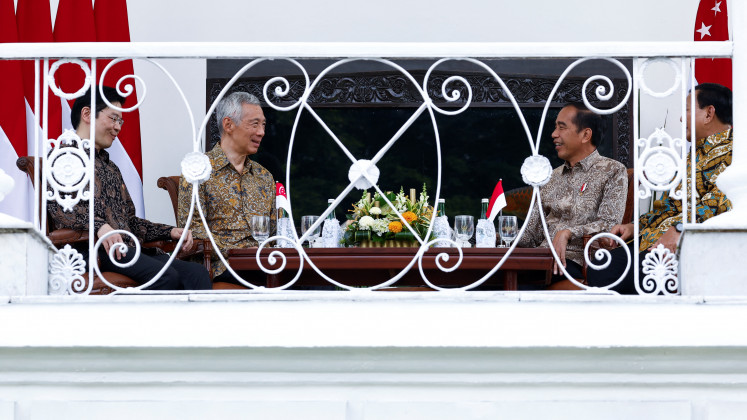‘Me Sambal You Chutney’ Discovering Indonesia, India connections through literature
Indonesia - India connections: Amol Titus explores the firm bonds between Indonesia and India in his latest book Me Sambal You Chutney
Change Size

Indonesia - India connections: Amol Titus explores the firm bonds between Indonesia and India in his latest book Me Sambal You Chutney.
From legends, history and a visit to a tailor in Mayestik in Jakarta, an Indian author based in Jakarta, Amol Titus, explores the firm bonds between Indonesia and India.
The book Me Sambal You Chutney: Indonesia and India is a collection of 32 short stories, poems and a play. It is the fourth work by Amol Titus, who works as a management consultant in Jakarta.
“I have lived in Indonesia since 1998 and as a creative writer, I have found great inspiration from the many similarities that I have found in the culture, art, architecture, music, dance, customs, religious practices and common struggles,” Titus wrote in an e-mail sent to The Jakarta Post.
“[The book] is inspired by these similarities, connections and linkages that have endured over the centuries.”
Stories and poems in the first chapter introduce the readers to legends and ancient Indian epics, such as the Mahabharata and Ramayana.
Titus is well aware that in Indonesia, the epics are told in slightly different ways. He opts to embrace the differences, intertwining the ancient Indian and the Indonesian versions of the epics into his literary work.
“There are no uniform interpretations of legends, history, culture and social realities. Nor should there be in diverse, multicultural and democratic societies like Indonesia and India,” he explains in the book.
A short story entitled “From Mahameru to Semeru” tells the legend of Mount Semeru in East Java. Following powerful tremors, Java breaks loose and floats off into the ocean. The Devas (deities) determine that a mountain must be installed on the eastern tip of the island in order to stabilize it. With help from Brahma and Vishnu, the Devas embark on a mission to move a huge part of Mount Mahameru in the Himalayas to Java.
The book is Titus’ tribute to two countries that have a special place in his heart. Born and raised in Jaipur, India, Titus moved to Jakarta in 1998, heading international management consulting group, IndonesiaWISE.
In the book, Titus makes references to prominent figures from India, such as former Prime Minister Nehru, and also some figures from Indonesia.
“I am very impressed by Indonesian icons like Sukarno, Hatta, Kartini, Cak Nur, Affandi and even the badminton star Susy Susanti, all of whom are featured in the book,” he explained.
Some of the stories take the readers to interesting sites in both countries, from the Haji Ali Mosque in Mumbai to the Mayestik shopping area in South Jakarta.
In “The Tailor of Mayestik”, Titus captures the warm relationship between a trusted tailor named Pak Wawan and his clients. Expatriate Indian women entrust Pak Wawan to sew matching blouses for their saris. In turn, the women teach him to make colorful Indian clothes: churidar trousers, kurtas (loose overshirts) and salwar kameezes (pleated trousers).

A love story is presented in “Me Sambal You Chutney”. It centers on an Indonesian food critic, Indah, and a young Indian chef, Armand, who find love as they discover great restaurants in Jakarta, teaching each other about the art of their respective favorite side dishes: Indonesia’s sambal (chili condiment) and India’s chutney (a spicy condiment made from fruits or vegetables with spices, sugar and vinegar).
Titus addresses the common struggles of both countries in a poem, “Who Clipped Our Wings”. The poem mentions several issues – from colonialism to the corruption that has shackled both countries.
The last chapter is dedicated to a historic moment on the bilateral relationship between two countries. In a play entitled “Air Visioner”, Titus creates a theatrical interpretation of the time Sutan Sjahrir, then prime minister of Indonesia, was prevented by the Dutch from attending the first Inter-Asia Conference in 1947 in India.
Sukarno tells Nehru of the situation, and the latter sends ace pilot Bijayananda “Biju” Patnaik to rescue Sjahrir.
The play also presents the characters of Indonesia’s founding father Mohammad Hatta and Biju’s wife, Gyan Patnaik, whom Titus describes as an unsung female visionary.
“I chose the medium of the play since it helped me incorporate many actual quotes of Nehru, Sukarno and Hatta on the Indonesia-India relationship that I believe must be revived and studied by the current generation,” Titus explained.
Titus is planning to release two books in the upcoming months: The Fellowship of Krakatau, a poetic dialogue between Indonesia’s great volcanoes, and Dance of Dynamic Democracies, a work of non-fiction that looks into the Indonesia-India relationship.









